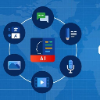Purpose: The rapid integration of artificial intelligence (AI) systems like ChatGPT, Claude AI, etc., has a deep impact on how work is done. Predicting how AI will reshape work requires understanding not just its capabilities, but how it is actually being adopted. This study investigates which intrinsic task characteristics drive users' decisions to delegate work to AI systems. Methodology: This study utilizes the Anthropic Economic Index dataset of four million Claude AI interactions mapped to O*NET tasks. We systematically scored each task across seven key dimensions: Routine, Cognitive, Social Intelligence, Creativity, Domain Knowledge, Complexity, and Decision Making using 35 parameters. We then employed multivariate techniques to identify latent task archetypes and analyzed their relationship with AI usage. Findings: Tasks requiring high creativity, complexity, and cognitive demand, but low routineness, attracted the most AI engagement. Furthermore, we identified three task archetypes: Dynamic Problem Solving, Procedural & Analytical Work, and Standardized Operational Tasks, demonstrating that AI applicability is best predicted by a combination of task characteristics, over individual factors. Our analysis revealed highly concentrated AI usage patterns, with just 5% of tasks accounting for 59% of all interactions. Originality: This research provides the first systematic evidence linking real-world generative AI usage to a comprehensive, multi-dimensional framework of intrinsic task characteristics. It introduces a data-driven classification of work archetypes that offers a new framework for analyzing the emerging human-AI division of labor.
翻译:暂无翻译




